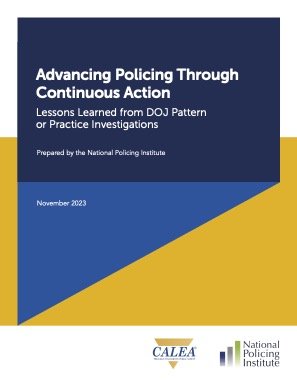By The National Policing Institute
The purpose of accreditation in law enforcement agencies is to establish a foundation of policies, procedures, and practices that promote optimal outcomes in policing. Consistent internal review of an agency’s policies and procedures, combined with third-party validation, supports the delivery of high-quality public safety services, and promotes a culture of accountability in policing. Stated simply, accreditation provides a roadmap for constitutional policing and ensures police agencies continuously consider legal standards, best practices, scientific evidence, and innovation. Many resources are available to law enforcement executives seeking to implement evidence informed and best practices in their agencies as part of the accreditation process. Model policies, training standards, and empirical research can all provide valuable information to inform police practice. National-level guidance on constitutional policing practices, however, can be particularly valuable. Indeed, the settlement agreements, including consent decrees, that the United States Department of Justice (DOJ) engages in with law enforcement agencies following “pattern or practice” investigations are presumed to outline important aspects of 21st Century Policing. The changes implemented by law enforcement agencies to address these agreements should, therefore, demonstrate aspects of constitutional policing in practice. Despite the value of the documentation surrounding these settlement agreements, there has been limited empirical examination of the organizational conditions and practices that precede formal intervention by the DOJ. The systematic identification of the factors contributing to DOJ involvement can provide critical insights for law enforcement executives who seek to be proactive in reviewing and enhancing their agency’s policies, training, and practices. In this vein, the Commission on Accreditation for Law Enforcement Agencies contracted the services of the National Policing Institute (hereafter the Institute) in 2022 to review recent pattern or practice investigations conducted by the DOJ to identify: • The events and organizational factors that precede an investigation; • The issues most commonly examined by pattern or practice investigators; • The investigative process and methodological approaches used to identify patterns or practices of unconstitutional policing; • The evidence cited to support observations of unconstitutional policing; and • The remedial measures outlined by the DOJ to address unconstitutional policing practices. Between 2010 and 2022, the DOJ initiated 27 pattern or practice investigations into law enforcement agencies. In this report, the Institute research team presents findings from a qualitative examination of the 19 pattern or practice investigations that had investigative reports and/or findings letters available for review. Specifically, content analysis was conducted on 21 documents, including 11 investigative reports and 10 findings letters, that were available for review across these investigations. The analysis of these documents identifies the reported process, findings, and recommendations produced from 19 DOJ pattern or practice investigations of law enforcement agencies The remainder of this report is organized as follows: Section 02 provides background on the authority of the DOJ to conduct pattern or practice investigations and the context surrounding those investigations. Section 03 presents the results of the research team’s content analysis. Section 04 provides a discussion of the findings and conclusion of the report. The methodology used to identify the sample of pattern or practice investigations and analyze the content of the investigative reports and findings letters for those investigations is outlined in Appendix A
Arlington VA: The National Policing Institute, 2023. 40p.



